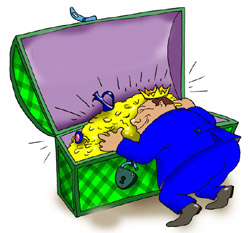Grants from foreign countries given to this or that country lead to the rise in corruption in the given country. In other words, people don’t work, get used to getting free money, get lazy, the psychology of dependency sets in and corruption takes its toll. The structures at the presidential dome fighting against corruption can go into further detail about this. We can go along with the same logic for political forces when it comes time for foreign countries to sponsor their projects. There has been a turn of events in Armenia during this pre-election period and while making predictions, we try and compare the same processes in neighboring countries and find similarities. For example, from which country is Arthur Baghdasaryan thinking about getting money from to lead his politics? Who will Ara Abrahamyan help during the elections? (who will he pay?-from the Armenian perspective)-(or Gagik Tsarukyan, whom we had the pleasure of seeing with the president’s speaker Victor Soghomonyan in the former park named after Kirov last Thursday around 5:00 p.m.). As a rule, the ones that deny the capital factor during the elections are the ones who are ready to put the money they have earned illegally on the table. But it turns out that this is democratic. For example, according to professor of theoretical economy department of the Yerevan State University and internationalist Levon Ghazaryan, democracy is an inseparable part of money. We can even say that the two go together. In other words, the similarity between people and money, as a universal object, is proof of that. According to him, money must be a factor during democratic elections.
“That is a theoretical standard and not a process that mixes things up. The money put in during elections is part of the democracy model. For example, in political science, we have a paradox of the democratic state model-the democratic state doesn’t have limits, in other words, it’s impossible to explain what kind of borders a democratic country should have. Any border is not good or bad from the other and it doesn’t matter where people are.”
So, the uncertainty of borders means that both people and the flow of money shouldn’t be controlled when there is democracy. That is what capital intervention means. As to how widespread that intervention will be, it depends on how the international community approves of societies and the regime striving to be globally integrated. The foreign capital intervention during elections will be natural only if the foreign powers actually consider Armenia a democratic state.
“This,” says the internationalist “depends on the fictiveness of democracy. Basically, capital is decisive during elections and, as proven in mathematician and Nobel Peace Prize winner Erou’s model, there just can’t be a democratic election with no contradictions. This theorem is very clever-in case of keeping the standards for democratic voting, according to Erou, in reality there is one decisive individual who, in this model, is called the director. He can also be called the dictator or king. So, the person making the decisions stays undercover, while the rest of the issues are solved by money. Once again, we come to the conclusion that money is an inseparable part during democratic elections.”
Mr. Ghazaryan even recommended recalling how the places in the parliament are distributed. They say this place costs this much and “this is not by chance”. People have to be judgmental-if they truly believe in democracy, then there must be capital intervention. The abovementioned theorem states that the type of capital decides how you can intervene in the election process. As Levon Ghazaryan says, the dollar has its different meanings as a financial loop-the narcotics dollar, oil dollar, Euro dollar. They are all tied together. The only thing that draws them apart is the chain of investments. These dollars can be raffled and serve as a firm basis for the democratization and election scenarios of different countries. For example, in Afghanistan they used the narcotic-dollar for establishing democracy, the oil dollar in Iraq and the Euro dollar in Ukraine. These types of dollars, according to Ghazaryan, become the basis for the plots. After the establishment of democracy in Afghanistan, the narcotics business grew.
“Let’s focus on Iraq and recall where the Americans “found” Saddam Hussein-in a pit. I think that that’s the kind of pit where they find oil. In reality, that’s not where they found him. It turned out later on that the hole was simply where they had done the taping. These are different kinds of plots which, in my opinion, have something to do with the meaning of money. Americans didn’t care where they found Hussein, but they had a special plot which shows the democracy-money connection.”
Mr. Ghazaryan has difficulty in saying which type of money will be used in Armenia if possible.
“The currency system has strengthened in Armenia. The Armenian dram has shown that it’s not dependent on the financing system. But the question is-do foreign countries really expect democracy to be established in Armenia and not a state of war?” The elections will take place and the money will be spent based on that.
The specialist says that in reality, there can’t be any democracy. It’s simply a theatre where money is the requisite.

